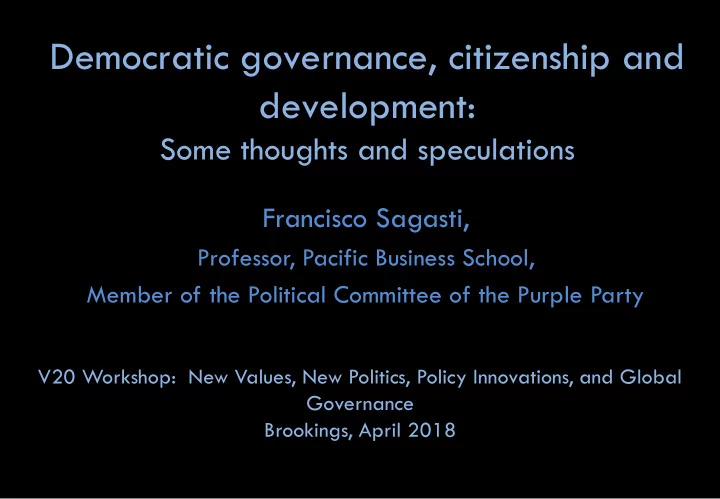

Democratic governance, citizenship and development: Some thoughts and speculations Francisco Sagasti, Professor, Pacific Business School, Member of the Political Committee of the Purple Party V20 Workshop: New Values, New Politics, Policy Innovations, and Global Governance Brookings, April 2018
New context for political action • Radical changes in the ways of exercising power and authority all over the world: • Disenchantment and lack of confidence in democracy; generalized mistrust of those who hold political power • Proliferation of authoritarian and messianic leaders, both from the left and right • Key role of new communications media; social networks, Internet; use of big data, data analytics, micro-targeting • Emergence and hardening of isolated ghettos alienated from the rest of citizens • Proliferation and prevalence of fake news; but, are we reaching a saturation point?
New context for political action • Modes of exercising political power and authority • Hard power (material) • Rational power (soft) • Emotional power (mushy) • Growing importance of the emotional (mushy) mode of exercising power • Relevance of single and critical issues capable of mobilizing citizens ( “Hot button issues: gender ideology, death penalty, taxes, gun ownership, etc.) • Importance of citizen identification with authorities, leaders and candidates (“he/she is like me”) • Means of communication and social networks as effective ways of promoting identification
SOME CONCEPTIONS OF THE NATURE OF POLITICAL POWER Type Hard Soft Mushy (material) (rational) (emotional) Dimension Persuasion, Identification, Pressures, threats, Foundations arguments, recognition, coercion, violence agreement emotional connection Force, control of Sentiments, Values, principles, Resorts to resources, access to affections, instincts, ideals, visions goods and services relations Domination, Reasons, laws, Images, messages, Uses violence, regulations, rules metaphors, stories punishment, reward norms Asymmetry, Equity, inclusion, Illusion of equality, acceptance of participation, perception of Implies inequalities horizontality closeness
SOME CONCEPTIONS OF THE NATURE OF POLITICAL POWER Type Hard Soft Mushy (material) (rational) (emotional) Dimension Familiar, Distant, remote, Exemplar, admired, recognized, Leadership style arrogant, imitated, inclusive complicit, fulminating conspiratorial Intermittent Systematic Constant visibility, Approach to presence, campaigns, exposure, communications inscrutable directed saturation; behavior messages disinformation National/Internatio Local/regional/ Scale Local/Regional nal National/Global
SOME CONCEPTIONS OF THE NATURE OF POLITICAL POWER Type Hard Soft Mushy (material) (rational) (emotional) Dimension Plans, strategies, Empathy, Decisions based Will (whims?) of expected results, convenience on the ruler consequences (improvisation?) Associated Dictatorship Democracy Autocracy? political system Tolerance, Rebellion, Reaction agreement/disagreem Protest, revenge revolution ent, consensus/dissent
CONCEPTIONS OF REALITY Virtual, simulation; Intangible, everything is Tangible, material; conceptual; Idea of reality opinion; reality is what it is reality is as you reality is what you interpret it want it to be Paradox Dialectics Logic (alternating Mental (opposition, conflict, (deduction, certitudes, processes outcome) induction) persistent ambiguities)
New context for political action • The exercise of political power and authority always combines the different modes (hard, soft, mushy) • But, there appears to be a displacement from a combination of material (hard) and rational (soft) power — with a certain predominance of the second — towards a greater weight of emotional (mushy) power • Is this hypothesis plausible? • What does it mean for the political models of the future? • How will it affect upcoming electoral processes? • What impact will it have on governance and ways of governing?
New context for political action • Question of a participant in one of the dissemination meetings of Agenda : PERU (Huancayo, Peru 2000): “Why is it that those who know how to win elections do not know how to govern, ... and those who know how to govern do not know how to win elections?” • With a political leadership crisis under way: Will it be possible to both win elections, ... and govern well?
Thank you www.franciscosagasti.com
Recommend
More recommend